Not all heat pumps are created equal, so choosing the right brand is key. This article reviews Ireland’s most popular heat pump brands. But first: What makes a good heat pump?
Always Look for these Features in a Heat Pump Brand
Reputation: Reputable heat pump brands fall into two main categories. Firstly, there are household-name brands that make a whole range of electronics, and have been supplying reliable products for decades. Secondly, there are niche manufacturers that have built a reputation specifically for heat pumps.
Good warrant terms: A long and comprehensive warranty indicates that a manufacturer is confident their heat pump will last. Plus, if something does go wrong, it means your investment is protected. But only if your heat pump warranty has solid backing:
Solid warranty backing: A warranty is only as good as the company that’s backing it. So opt for a heat pump brand with a solid business that’s been around for a long time. That way, you can be confident that your manufacturer will still be around for the duration of your warranty, and longer.
High efficiency: The whole point of a heat pump is that it’s far more efficient than an oil or gas boiler. Still, some models are much more efficient than others. The best measure of efficiency is the “SCOP” (seasonal coefficient of performance). Choose the heat pump with the highest SCOP score.
Future-proof refrigerant choice: The EU is starting to restrict some refrigerants used in heat pumps because of their environmental impact. So choosing the wrong refrigerant now could make it difficult to service your heat pump down the line. My advice is to avoid R-410a and R-134a, as these will be first to go. R-32 will be around for longer, but it will eventually come under pressure, too. My recommendations are R-290 and R-744, as these are eco-friendly and refills will be available for the lifetime of your heat pump.
Consider These Depending on Your Personal Requirements:
Water Flow Temperature: Some heat pumps have a high output temperature, making them a convenient replacement for oil boilers. On the other hand, low-temperature heat pumps are more efficient, but may require special heat pump radiators.
Domestic Hot Water Production: Some heat pumps provide space heating only, while others also provide domestic hot water for taps and showers. Domestic hot water is a worthwhile feature in most cases, as it will increase the savings on your energy bills.
Heat Pump Aesthetics: The outdoor unit for air-source heat pumps can impact on the aesthetics of your home. One way to deal with this is to hide the heat pump behind a fence or other object. But another approach is to simply choose a good-looking heat pump. Or choose a ground-source heat pump which hides the outdoor components underground. Thankfully, many brands now offer stylish heat pumps.
Price: Shop for quality first, and heat pump prices second. But you can still save a by shopping around. And don’t forget to claim your €6,500 grant for heat pump installations in Ireland.
Kensa Heat Pumps

Based in Cornwall England, Kensa both manufacture and install ground-source heat pumps. They have two products for the residential market: Shoebox and Evo.
As its name suggests, the Kensa Shoebox heat pump takes up very little indoor space. Naturally, the heat output is also on the small side, at 3 or 6 kW. So it’s best suited to small/well-insulated homes where head demand is lower and space is at a premium. SCOP (~350% at 35 °C) scores are lacklustre by ground-source heat pump standards. But this won’t be a major issue given the product’s niche is homes with already-low heating demand: 350% efficiency is more than enough to keep heating bills low for those kinds of homes.
The more typically-sized Kensa Evo heat pump comes has versions with power outputs from 7-17 kW: About right for mid-to-large Irish homes. SCOP scores are also higher with the Evo model (~450% at 35 °C).
Kensa heat pumps don’t have an in-built Legionella pasteurisation cycle. So if you connect a Kensa heat pump to your domestic hot water system, install an immersion timer that will heat the full contents of your hot water cylinder above 65 °C at least once per week. Keeping pasteurisation external is an advantage for PV solar panel owners, because it makes Kensa heat pumps compatible with power diverters like the MyEnergi Eddi.
Passive cooling is available with Kensa heat pumps.
Daikin Heat Pumps

Daikin is a long-established Japanese heat pump manufacturer, which now has factories on multiple continents. Thier heat pumps generally come with a 5-year guarantee, and the company’s long history means they are likely to be around for the long run.
Efficiency can be decent with Daikin heat pumps. For example, their Altherma models specify an SCOP efficiency of 450%.
Aesthetics are another area where Daikin does well. They have plenty of offerings other than the standard “industrial white box” look:
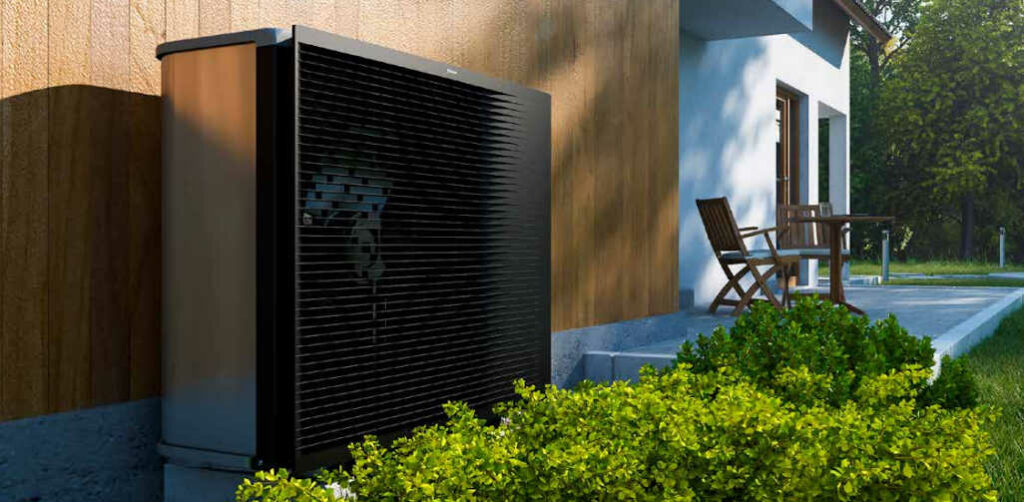
One thing to watch out for with Daikin heat pumps is their choice of refrigerant. This is because Daikin still use HFCs in many of their heat pumps. This may make the units difficult to service in the future. Be wary of R-410a in particular.
As a large player in the heat pump market, it’s no surprise that Daikin offer both low and high-temperature heat pumps. Versions with domestic hot water output are available, too.
Daikin fall somewhere in the middle of the bunch when it comes to price.
Daikin Air-Source Heat Pump Datasheets:
Daikin Ground-Source Heat Pump Datasheets:
Vaillant Heat Pumps

Vaillant is a heating system dynasty. Though founded nearly 150 years ago, the company is still 100% family owned. This bodes well for the company being around to honour their guarantees.
Speaking of guarantees – the length of Vaillant’s guarantee depends on the heat pump installer. As long as 7 years with one of Vaillant’s approved installers, or as short as 2 years otherwise. So be careful who fits your heat pump if you go with Vaillant.
Vaillant heat pumps tend to be decent-looking:
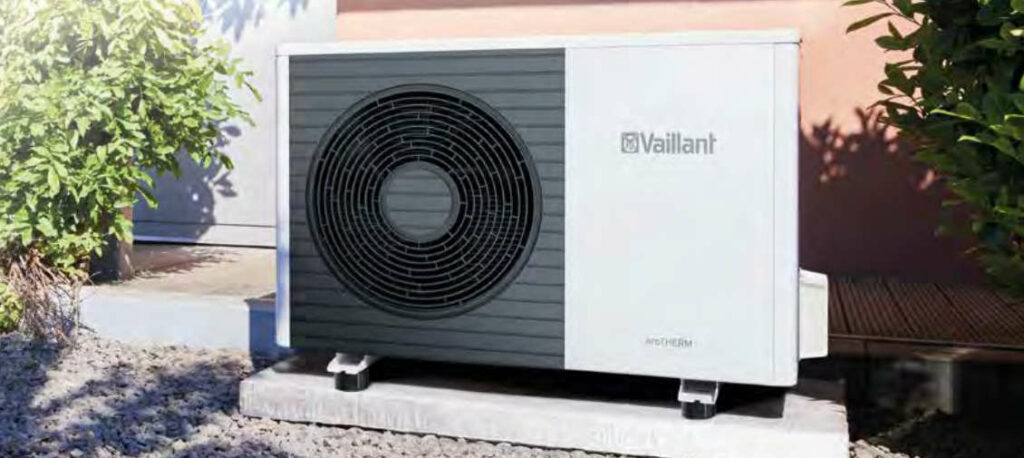
Vaillant is making a big move towards R-290, a future-proof refrigerant. In particular, their recently-introduced Aerotherm Plus range uses R-290, and Vaillant recently opened a new production line for these models in England. However, some Vaillant models, like Aerotherm Split still use R-410a. So double-check the datasheet before you buy.
Another reason to favour Vaillant’s Aerotherm Plus heat pumps is their high efficiency (SCOP). While many Vaillant heat pumps have good efficiency at around 400%, the Aerotherm Plus range pushes SCOP to a spectacular 500% in some cases. They can also provide domestic hot water without needing a boost from an immersion heater, saving even more energy.
Vaillant air source heat pump datasheets:
Vaillant ground/water source heat pump datasheets:
Mitsubishi Ecodan Heat Pumps
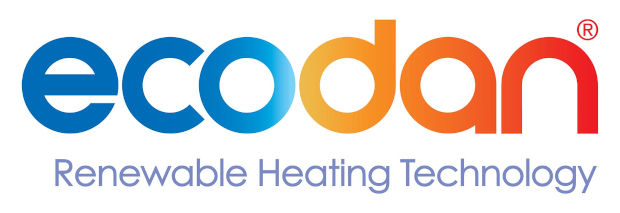
Another Japanese manufacturing giant – Mitsubishi have taken a big chunk of Irish market with their Ecodan heat pumps. Ecodan heat pumps are unremarkable but solid performers in almost every category.
For instance, Ecodan heat pumps have solid, albeit not spectacular, efficiency. Specifically, SCOP scores above 450% are achievable at low flow temperatures.
Aesthetics are a little weaker for Ecodan heat pumps than some other brands. But still better-looking than your average oil or gas boiler:
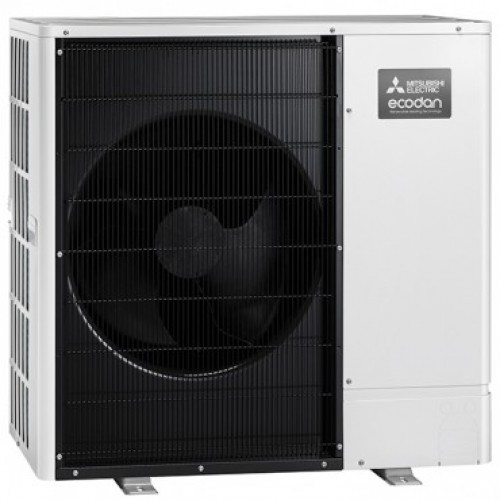
Ecodan warranty is 5 years. But there’s a catch: You must remember to register your heat pump – otherwise you only get one year of warranty. On the upside, Mitsubishi has a massive diversified business that’s likely to be resilient going forward. So double check that you register that warranty, and you should be fine.
Price-wise, Ecodan do well, with a slight cost advantage over most other heat pumps.
Ecodan use R-32 refrigerant, a potent greenhouse gas, in their heat pumps. So servicing Ecodan heat pumps could become difficult as environmental regulations get tighter. On the other hand, as HFCs go, R-32 is the best of the bunch. Indeed, it’s almost certain to be around longer than the R-410a which many other heat pump brands are still using. So while refrigerant choice lets Ecodan down somewhat, it’s not a particularly bad result.
Mitsubishi’s coastal protection upgrade should be of special interest to those living near the sea. This is an optional feature available on all Ecodan heat pumps which reduces salt-induced corrosion. It does not impair the performance or specifications of the heat pumps. But the coastal protection does come with a price premium.
On the other hand, if you’re looking for an Ecodan ground-source heat pump… then you’re out of luck. This is because Mitsubishi have chosen to focus exclusively on air-source technology.
Mitsubishi Ecodan air-source heat pump datasheets:
- Ecodan R744 Quiet 4.3kW
- Ecodan R410a PUHZ 5kW 8.5kW 11.2kW 14kW
- Ecodan R410a Quiet PUHZ 8.3kW 11kW
- Ecodan R32 Quiet 6kW
- Ecodan R32 14kW
Samsung Heat Pumps

If you’ve heard any company on this list, you’ve probably heard of Samsung. The Korean electronics giant makes everything from smartphones to, well, heat pumps. Samsung heat pumps have competitive specs:
First off is high efficiency, with SCOP efficiency scores in the region of 450%.
Next up is a solid warranty. Samsung leads the pack when it comes to their warranty period at 7 years. And better still, the warranty is backed by a household name brand.
Samsung’s heat pump pricing is also keen.
Aesthetics-wise, let’s just say it’s clear that Steve Jobs was working for Apple, not Samsung, when these heat pumps were designed:
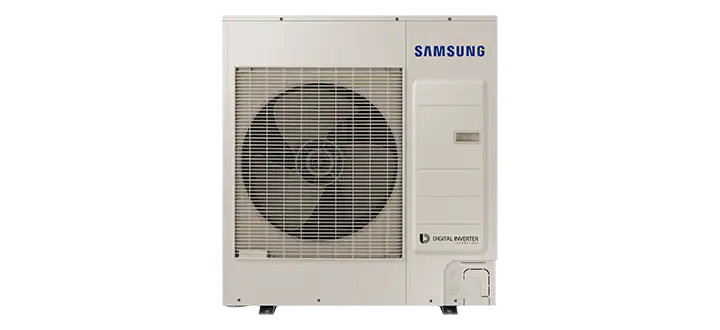
Refrigerant choice is also a weaker area for Samsung heat pumps. As with Ecodan, Samsung use R-32. R-32 is certainly not the worst choice. But it’s not the most future-proof either.
As with Mitsubishi, Samsung supply air-source heat pumps only. No ground-source heat pumps. Also, Samsung are not forthcoming with datasheets.
Stiebel Eltron Heat Pumps

Stiebel Eltron is a German heating system manufacturer with an increasing focus on heat pumps.
As you might expect from a Germany company, efficiency scores are good, with SCOPs in the territory of 450% for their air-source heat pumps. But their ground-source heat pumps really steal the show, offering SCOP scores above 550%.
7-year warranty cover is available for Stiebel Eltron heat pumps. But there are stings attached: The heat pump must be fitted by an approved installer and a logbook kept as proof of annual servicing. Otherwise, the warranty period is 2 years.
Stiebel Eltron heat pumps are generally inverter-driven, which should bode well for longevity. And their air-source models are monobloc, which simplifies the installation process.
Flow temperatures up to 75 degrees C are available. This feature facilitates retrofits using existing radiators. And to save space, Stiebel Eltron offer ground-source heat pumps with integrated hot water tanks.
At least to my eyes, Stiebel Eltron make good-looking heat pumps. Here’s a picture, so you can decide for yourself:
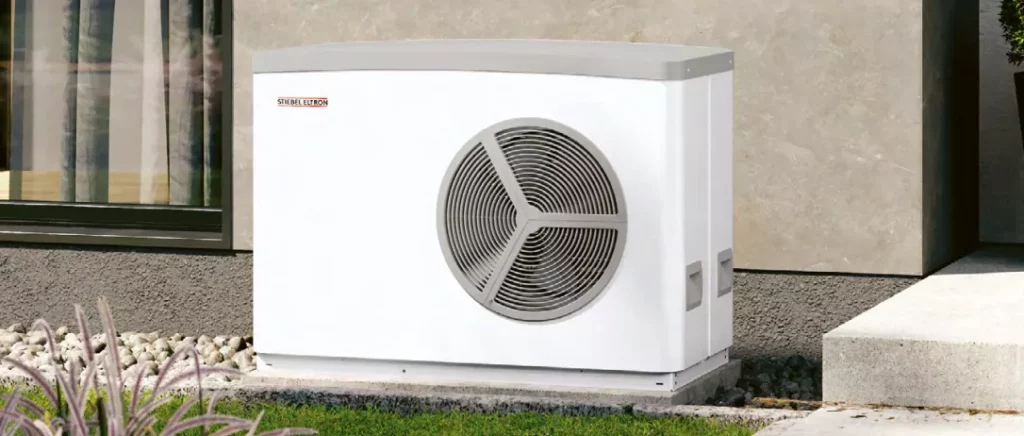
Quietness is another strong point for Stiebel Eltron heat pumps, with the premium models clocking in at just 48 decibels.
Those premium features land Stiebel Eltron heat pumps near the top of the price range.
Stiebel Eltron use a range of refrigerants. On the one hand, some Stiebel Eltron models still use the potent greenhouse gas R-410a, which is best avoided. On the other hand, Stiebel Eltron are using R-454c in their premium models. As refrigerants go, R-454c is a relatively weak greenhouse gas. Stiebel Eltron also have models using R-32, with an in-between environmental impact.
While R-32 is a reasonable choice of refrigerant in many cases, I would caution against buying a Stiebel Eltron heat pump that uses R-32. This is because anyone paying the premium for a Stiebel Eltron heat pump presumably expects several decades of longevity. R-32 may come under pressure from EU regulations within such a lifespan.
In the German tradition, Stiebel Eltron’s datasheets are top-notch. But their product codes are beyond me. My only decryption clue is that GB models come with an integrated hot water tank:
Stiebel Eltron Air-Source Heat Pump Datasheets:
Stiebel Eltron Ground-Source Heat Pump Datasheets:
Thermia Heat Pumps

Thermia started in 1923 as a Swedish heating system manufacturer. Over time, the company found a niche in the Scandinavian heat pump market. Then, in 2005, Thermia was acquired by Danfoss. The company was sold again in 2018, this time to Stiebel Eltron.
Thermia have a special focus on ground-source heat pumps. Which makes sense given that ground-source heat pumps are particularly well-suited to handle the harsh climate of Scandinavia.
And it’s Thermia’s ground-source heat pumps that steal the show when it comes to efficiency. Indeed, their 18 kW Atlas heat pump smashes the 600% efficiency barrier! Meanwhile, the efficiency of Thermia’s air-source heat pumps ranges from okay to very good. Efficiency varies considerably from model to model, so check the datasheet. Indeed, we’ll see that variation between models is a theme with Thermia…
Thermia use a range of refrigerants, including R-410a, R-407c, and R-32. Try to avoid R-410a and R-407c where possible.
Aesthetics vary too:
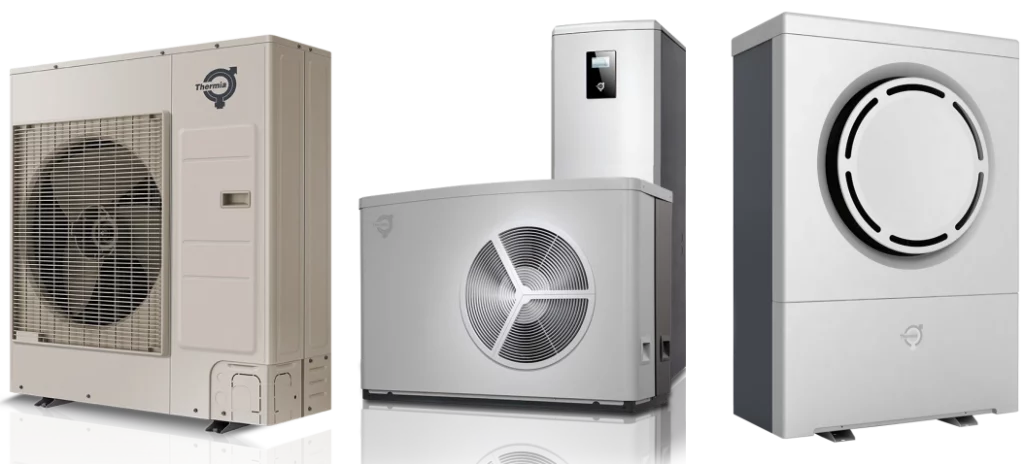
There are also dramatic differences in technology between models in the Thermia range. Among their air-source heat pumps, the Athena and iTec Eco models use inverters, while the Atec does not. Inverter-driven heat pumps should have longer lives as they can throttle power rather than operating in stop-start mode. This is gentler on moving parts.
Thermia come from Sweden, home of IKEA. And like IKEA, their products have short, punchy names:
Thermia Ground-Source Heat Pump Datasheets:
Conclusion: Choosing a Heat Pump Brand
There’s plenty to consider when choosing a heat pump brand. But no need to be overwhelmed. Competent heat pump installers can recommend a heat pump brand and model that’s suitable for your needs.
For independent advice, you can talk to a heat pump Technical Advisor. These are trained experts who can recommend a reputable heat pump installer. That’s one of the reasons why getting a Technical Assessment should usually be your first step towards installing a heat pump.
Note also that installers tend to have certain heat pump brands that they work with. They may be familiar with the installation process for a particular brand, and have a strong supply chain from a certain manufacturer. So if you know what brand you want, then it’s important to choose an installer that’s a good fit with the brand in question.